"We must not allow protectionism to take root and the world to drift into separate blocs."
1 We must not allow protectionism to take root--and the world to drift into separate blocs
We have calculated that a world divided would lose at least 1.5 percent of GDP annually. And the cost would be much higher--2 times higher or more--for open economies, those that depend on international cooperation.
But we need not go that way. We can turn the tide and prevent sleepwalking into a world that is poorer and less secure.
2 Second, debt. This is challenging for everybody post-COVID. But for 25 percent of emerging market economies and 60 percent of low-income countries, it is crushing their ability to deal with food and energy insecurity. . .
3 Shocks will continue to hit us. But it is clear is that if we invest in climate-resilient agriculture and low-carbon development, we can have higher standards of living for people everywhere.. .We have US$40 billion today for the Resilience and Sustainability Trust, with four countries benefiting already. And we can do much more if you help us to do so.. ."
Georgieva has long warned against fragmentation of the world economy into blocs led by the United States and Western allies on one side, and China and other state-driven economies on the other, saying this would lead to differing technology and regulatory standards and increasing trade protectionism.
IMF Managing Director Kristalina Georgieva Remarks at the G20 Leaders’ Summit
IMF Managing Director Kristalina Georgieva Remarks at the G20 Leaders Summit
November 15, 2022
As prepared for delivery
Congratulations to President Jokowi for bringing us together in this wonderful setting.
We are discussing the issue of food and energy security at a particularly challenging time.
Hopeful signs of recovery last year were replaced by an abrupt slowdown in the world economy because of COVID, the war in Ukraine, and climate disasters on all continents. This pushed prices up and led to a tightening of financial conditions.
This is hard for everybody, but especially for emerging market and developing economies. They are experiencing, in many cases, high debt levels and depreciation of their currencies and, in this very difficult time, suffering even more from the high interest rates.
So what is the result of all this? We are seeing a reversal of all we had been fighting for: bringing poverty down, bringing hunger down. Now we have 345 million people that are suffering from a food crisis.
And this is where the G20 can do so much to change the prospects for the world economy.
First, by allowing trade to do its job. Removing barriers, especially for food and fertilizers, can go a long way to counter the suffering of hundreds of millions of people. We must not allow protectionism to take root--and the world to drift into separate blocs.
We have calculated that a world divided would lose at least 1.5 percent of GDP annually. And the cost would be much higher--2 times higher or more--for open economies, those that depend on international cooperation.
But we need not go that way. We can turn the tide and prevent sleepwalking into a world that is poorer and less secure.
Second, debt. This is challenging for everybody post-COVID. But for 25 percent of emerging market economies and 60 percent of low-income countries, it is crushing their ability to deal with food and energy insecurity.
I am pleased that the G20's Common Framework for debt treatment is finally beginning to deliver—with Chad being the first country to complete an agreement with its official and private sector creditors. But we need to do much, much more.
Third, invest in resilience. Shocks will continue to hit us. But it is clear is that if we invest in climate-resilient agriculture and low-carbon development, we can have higher standards of living for people everywhere.
I want to take this opportunity to thank all those who have contributed SDRs so that the IMF can on-lend them to our member countries who need them most. We have US$40 billion today for the Resilience and Sustainability Trust, with four countries benefiting already. And we can do much more if you help us to do so.
The G20 has stepped up before during crisis situations. We look forward to the G20 stepping up again to help meet the difficult challenges facing the world now.
Thank you! Terima kasih!
IMF Communications Department
MEDIA RELATIONS
PRESS OFFICER: Ting Yan
Phone: +1 202 623-7100Email: MEDIA@IMF.org
The head of the International Monetary Fund, Kristalina Georgieva, painted a dark picture of the global economy.
Video

WASHINGTON — The head of International Monetary Fund warned on Thursday that recession risks across the globe were rising as a toxic mix of inflation, higher borrowing costs and lingering supply chain disruptions continued to batter the global economy.
✓ Kristalina Georgieva, the leader of the I.M.F., said that as a result of these persistent problems, the international body would downgrade its growth projections for next year in an upcoming report, one that she said would paint a dark picture of the looming economic threats. The assessment is the latest example of how last year’s optimism for a strong global recovery has been replaced by worries about rapid inflation, Russia’s war in Ukraine and an ongoing pandemic.
“Multiple shocks, among them a senseless war, changed the economic picture completely,” Ms. Georgieva, the I.M.F.’s managing director, said in remarks prepared for a speech at Georgetown University. “Far from being transitory, inflation has become more persistent.”
RELATED CONTENT
-
IMFC Press Briefing
International Monetary Fund and Financial Committee (IMFC) Chair Nadia Calvino and IMF Managing Director Kristalina Georgieva summarized the outcome of...
-
IMFC B-Roll Package
The International and Monetary Financial Committee met in Washington, DC Friday (October 14), the culmination of the World Bank and IMF Annual Meetings. The group’s...
-
European Department Press Briefing
Alfred Kammer, Director of the IMF’s European Department held a press conference to address questions about Europe’s economy, including...
-
Debate on the Global Economy
Key leadership figures debated the global economy on Thursday afternoon, moderated by CNN Anchor Richard Quest. Among the main topics for...
-
IMF Georgieva Press Briefing
The IMF’s Managing Director Kristalina Georgieva set out the Fund’s Global Policy Agenda during her press briefing Thursday morning...
-
Getting to Net Zero
The shared message at the IMF’s seminar on getting to net zero was that the time to act is now. Multilateral institutions including IFIs are key contributors to the climate...
-
Christine Lagarde Interview
In a wide-ranging interview with IMF Today, President of the European Central Bank Christine Lagarde highlighted tackling inflation as the key challenge...
-
Extreme Poverty Imminent Unless...
As the global economy is suffering turbulent times, the IMF has warned Governments that they must reduce budget...
-
IMF/ Fiscal Monitor October 2022 Update
The global economy is slowing amid continued tight financing conditions, announced Vitor Gaspar, Director of the Fiscal Affairs Department at the IMF...
-
IMF GFSR Global Financial Stability
The IMF is warning of a period of ‘extreme volatility’ in financial markets in the latest Global Financial Stability Report released Tuesday (October...
-
IMF World Economic Outlook Growth...
The IMF issued a gloomy forecast for global growth, downgrading its forecast for 2023 in its World Economic...
-
IMF/ Global Financial Stability Report October...
Risks have increased since the April 2022 Global Financial Stability Report and the balance is skewed to the downside...
World Economic Outlook (October 2022)
This version of the IMF Data Mapper contains only selected key indicators from the World Economic Outlook (WEO). The WEO publication is available in full on the IMF’s website, www.imf.org. Accompanying it on the website is a larger compilation of data from the WEO database than is included in the IMF Data Mapper.
The data appearing in the World Economic Outlook (WEO) are compiled by the IMF staff at the time of the WEO exercises. The historical data and projections are based on the information gathered by the IMF country desk officers in the context of their missions to IMF member countries and through their ongoing analysis of the evolving situation in each country. Historical data are updated on a continual basis, as more information becomes available, and structural breaks in data are often adjusted to produce smooth series with the use of splicing and other techniques. IMF staff estimates continue to serve as proxies for historical series when complete information is unavailable. As a result, WEO data can differ from other sources with official data, including the IMF’s International Financial Statistics.
The WEO data and metadata provided are “as is” and “as available,” and every effort is made to ensure, but not guarantee, their timeliness, accuracy, and completeness. When errors are discovered, there is a concerted effort to correct them as appropriate and feasible. For details on the terms and conditions for usage of the WEO database, please refer to the IMF Copyright and Usage website, http://www.imf.org/external/terms.htm.
X
.jpg)
.jpg)
.jpg)
.jpg)
.jpg)

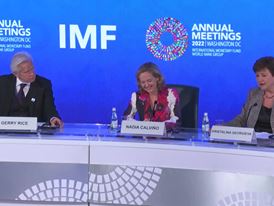
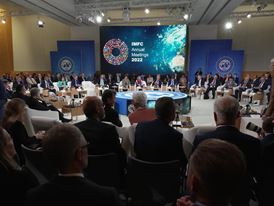
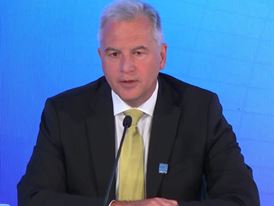
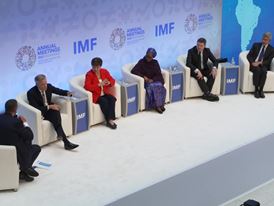
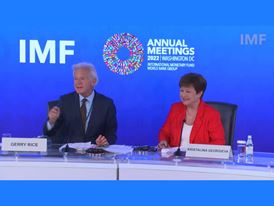
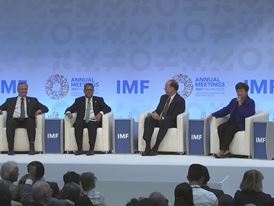
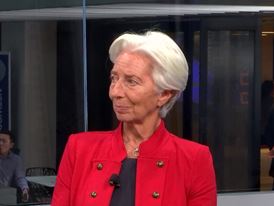
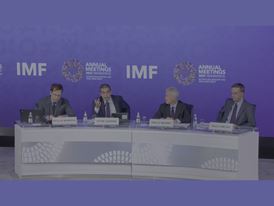
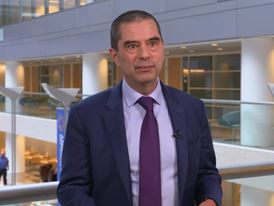
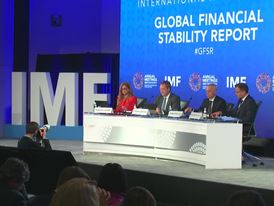
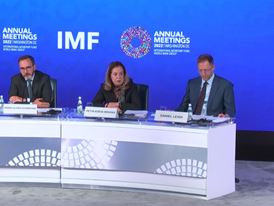
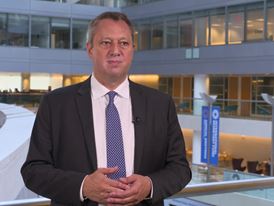


No comments:
Post a Comment